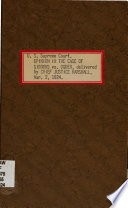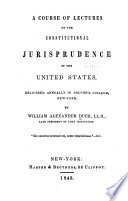 | United States. Supreme Court - 1824 - 952 páginas
...the act is supposed to be, necessarily, incidental to the power expressly granted to Congress, and implies no claim of a direct power to regulate the purely internal commerce of a State, or to act directly on its system of police. So, if a State, in passing laws on subjects " acknowledged... | |
 | United States. Supreme Court, John Marshall - 1824 - 32 páginas
...supposed to be necessarily incidental to the power expressly granted to congress, and implies no daim of a direct power to regulate the purely internal commerce of a state, or to act directly on its system of police. So, if a state, in passing laws on subjects acknowledged to... | |
 | New York (State). Legislature. Senate - 1831 - 608 páginas
...State, the act is supposed to be necessarily incidental to the power expressly granted to Congress, and implies no claim of a direct power to regulate the purely internal commerce of a State, or to act directly on its system of police. So, if a State, in passing laws on the subjects acknmcledged... | |
 | James Kent - 1832 - 590 páginas
...the act is supposed to be necessarily incidental to the power expressly granted to Congress, and it implies no claim of a direct power to regulate the purely internal commerce of a state, or to act directly on its system of police. The court construed the word regulate to imply full power... | |
 | John Marshall - 1839 - 762 páginas
...state, the act is supposed to be necessarily incidental to the power expressly granted to congress, and implies no claim of a direct power to regulate the purely internal commerce of a state, or to act directly on its^syjtemofpolice. So, if a state. in passing laws on subjects acknowledged to... | |
 | William Alexander Duer - 1843 - 442 páginas
...to the power expressly granted to regulate commerce with foreign nations and among the states, and implies no claim of a direct power to regulate the purely internal commerce of a state, or to act directly on its system of domestic police. So, if a state, in passing laws on subjects acknowledged... | |
 | 1845 - 436 páginas
...to the power expressly granted to regulate commerce with foreign nations and among the states, and implies no claim of a direct power to regulate the purely internal commerce of a state, or to act directly on its system of domestic police. So, if a state, in passing laws on subjects acknowledged... | |
 | E. Fitch Smith - 1848 - 1004 páginas
...state, the act is supposed to be necessarily incidental to the power expressly granted to congress, and implies no claim of a direct power to regulate the purely internal commerce of a state, or to act directly on its system of policy. So, if a state, on passing laws on subjects acknowledged to... | |
 | James Kent - 1851 - 706 páginas
...the act is supposed to be necessarily incidental to the power expressly granted to congress, and it implies no claim of a direct power to regulate the purely internal commerce of a state, or to act directly on its system of police. The court construed the word regulate to imply full power... | |
 | 1920 - 516 páginas
...v. Ogden, Mr. Chief Justice Marshall, speaking of the commerce clause of the Constitution, says, it "implies no claim of a direct power to regulate the purely internal commerce in the state, or to act directly on its system of police," and farther on he speaks of the states'... | |
| |